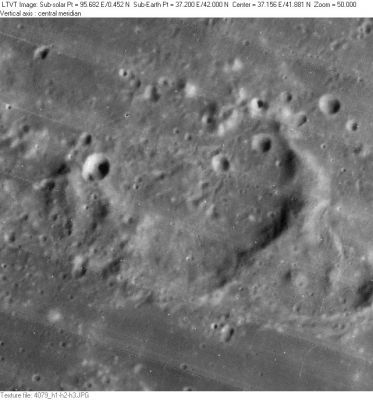Williams
Contents
Williams
|
Lat: 42.0°N, Long: 37.2°E, Diam: 36 km, Depth: 0.83 km, Rükl: 14 |
Table of Contents
[#Williams Williams]
[#Williams-Images Images]
[#Williams-Maps Maps]
[#Williams-Description Description]
[#Williams-Description: Wikipedia Description: Wikipedia]
[#Williams-Additional Information Additional Information]
[#Williams-Nomenclature Nomenclature]
[#Williams-Shannen Ridge Shannen Ridge]
[#Williams-LPOD Articles LPOD Articles]
[#Williams-Bibliography Bibliography]
[#Williams-A. S. Williams in the Sourcebook Project (William R. Corliss) A. S. Williams in the Sourcebook Project (William R. Corliss)]

LO-IV-079H Williams is the open enclosure at the center. The 5-km circular crater on its western rim is Williams N. The only other named feature in this view is 4-km Williams R in the upper right (at about 2 o’clock from the center of Williams).
Images
LPOD Photo Gallery Lunar Orbiter Images Apollo Images
Maps
(LAC zone 27A4) LAC map Geologic map
Description
Description: Wikipedia
Additional Information
Depth data from Kurt Fisher database
- Westfall, 2000: 0.83 km
Nomenclature
- Arthur Stanley Williams (1861 - November 21, 1938) was a British solicitor and amateur astronomer. He dedicated himself to the telescopic observation of the planets. Using a 6.5 inch reflector on an equatorial mount for most of his work, he published an influential paper in 1896: "On the Drift of Surface Material of Jupiter in Different Latitudes." With this work he greatly strengthened the efforts to systematically observe Jupiter. He also invented the naming of belts and zones in 1898. He championed the method of determining the longitude of surface features using their central meridian transit. In 1899 he published his most influential paper: "Periodic Variations in the Colours of the two Equatorial Belts of Jupiter." He also observed spots on Saturn, and the "linear features" on Mars, called "canals". He agreed early on with E. M. Antoniadi that these were largely illusory.
- According to Whitaker (p. 226), this name was introduced by Krieger and König.
- This crater could also honour the unfortunate NASA astronaut Clifton Curtis "C.C." Williams, who should have been the Lunar Module Pilot (LMP) of the original Apollo 12 crew, see Clifton C. Williams, and also Thomas Richard Williams (1824-1871, British professional photographer and one of the pioneers of stereoscopy).
Shannen Ridge
- A previously undetected ridge which runs from the part of the Montes Caucasus near Eudoxus toward the southern rim of Lacus Mortis (over the couple Plana and Mason) to Williams is unofficially called Shannen Ridge by Maurice Collins (with Charles Wood co-author of the 21st Century Atlas of the Moon). The name Shannen Ridge is incorporated on chart 9 of this atlas.
LPOD Articles
Bibliography
A. S. Williams in the Sourcebook Project (William R. Corliss)
- In Mysterious Universe, a handbook of astronomical anomalies (1979) :
- Page 435: Periodic Disturbances in the Northern Hemisphere of Jupiter (A. Stanley Williams, Observatory, 1900).
Articles in which A.S.Williams is mentioned :
- Page 406: The Bright Projections on Mars (Observatory, 1894).
- Page 433: Is Jupiter "Humpy"? (A.M.W.Downing, Journal of the British Astronomical Association, 1910).
- Page 455: On the Phenomenon of the Transit of the First Satellite of Jupiter (E.E.Barnard, Monthly Notices of the Royal Astronomical Society, 1892).
- Pages 570 to 572: The Temporary Stars (David E. Packer, Journal of the British Astronomical Association, 1894). Note: in this article only the name Williams is mentioned. It's not sure if this is A.S.Williams... - DannyCaes DannyCaes Apr 21, 2015
This page has been edited 1 times. The last modification was made by - tychocrater tychocrater on Jun 13, 2009 3:24 pm - afx3u2